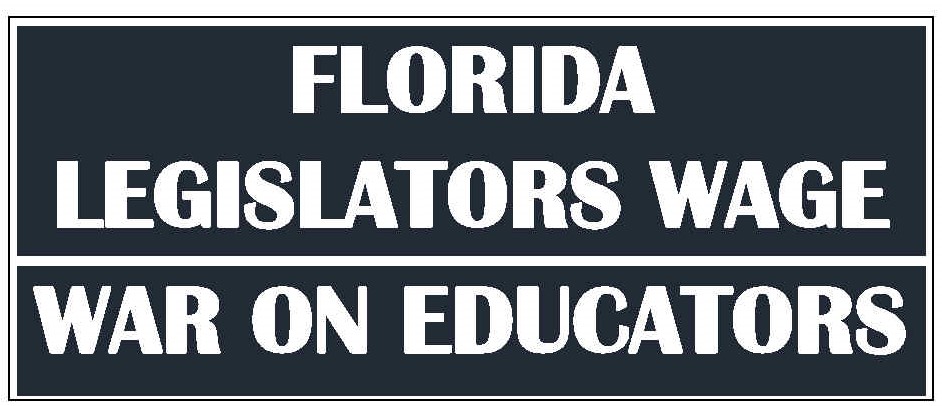NEWS RELEASE April 19, 2021
Contact: Candi Churchill, UFF Executive Director, [email protected]
FOR IMMEDIATE RELEASE
Florida Legislators Wage War on Educators’ Freedom
Tallahassee, FL (April 19, 2021) – Following a series of attacks on the constitutional protections afforded to all Floridians, the Florida Legislature is set to move this week on SB 1014/HB 835, a bill which infringes on educators’ freedoms and focuses instead on government overreach and fiscal irresponsibility. For the past year, educators across Florida have made innumerable sacrifices to protect their health and the health and safety of their students, while providing a high-quality education for all. The United Faculty of Florida (UFF), with 33 chapters and over 20,000 higher education professionals, have been crucial in this process. Instructors, librarians, counselors, graduate employees, and staff have literally saved lives by coming together during this pandemic and ensuring scientifically-based protections and appropriate accommodations for the most at-risk students and colleagues.
Some elected leaders in Tallahassee, however, are choosing this tumultuous time to attack their rights to continue to advocate for our students by proposing bills that would eliminate dues deductions for public employees, endangers constitutionally protected collective bargaining rights agreed to by employers and workers over the course of 40 years in Florida, and puts into question the ability to make personal decisions without government overreach.
Art. 6 of the Florida Constitution guarantees the following:
“Right to work. —The right of persons to work shall not be denied or abridged on account of membership or non-membership in any labor union or labor organization. The right of employees, by and through a labor organization, to bargain collectively shall not be denied or abridged. Public employees shall not have the right to strike.”
UFF and FEA members demand our legislators honor the founding principles of our nation and the state of Florida constitution and vote no on SB 1014/HB 835. The next committee stop for SB 1014 is in the Rules Committee at 8:30am on Tuesday April 20. If it passes committee, it will be heard on the senate floor Wednesday, April 21. Meanwhile, its companion (HB 835) is on the House special-order calendar and will also be taken up by the chamber on Tuesday.
Below are reactions from UFF leaders across the state:
“This past year has been an especially challenging one for UFF members. Faculty and graduate assistants around the state have spent the last year re-inventing Higher Education in Florida, bargaining safe working conditions for faculty, graduate assistants, and staff and safe learning conditions for our students. We have advocated for increased testing, tracing, health-risk accommodations, and improved sanitation. We have fought for safe campus reopenings and for state and federal funding to close the digital divide and provide equitable access to quality public higher education for all of Florida’s students. Our freedom to join together to advocate collectively for our profession and our communities will be severely undermined by SB1014/HB835. We call on all Floridians to with join us and other public employees in demanding our elected representatives and senators vote NO on these repressive bills.”
– Karen Morian, Ph.D., UFF president, [email protected]
“As a former CEO that managed tens of thousands of employees and as a life-long Republican who first campaigned for Barry Goldwater in 1964, SB 1014 and HB 835 gives me great concern.
Public employee unions (particularly educators) will be compelled to report, and will be audited for accuracy by their employer, regarding the percent of the bargaining unit that are members of the union. To keep their collective bargaining rights, a union must have 50% of the workforce as paying members and they can no longer have dues deducted directly from paychecks. These bills, however, carve out correction officers, police, and fire fighter unions.
I have further concern about compelling educators to identify their political leanings in other bills rushing through the session. I understand that some professors have expressed partisan positions in a captive classroom, and that should be avoided and dealt with. As a Conservative Republican, I don’t like our institutions at K-12 or in higher education to become indoctrination factories, and that can be managed. But compelling disclosure of political beliefs is something that they do in Russia and China, not in the U.S. Simply stated, I don’t care what they believe, as long as they teach the whole picture, and accurately.
I wore a military uniform for two decades in the Cold War – although the Vietnam War then seemed hot enough – to fight back against such tactics. Then we see them presented here in our own state. It’s appalling.
Treating teachers, bus drivers, nurses, and state workers differently from police and firefighters/rescue–this amounts to legislative harassment against public employees. The Republican Party has been my party for half a century. Legislators have a duty to do the right thing and stop attacking the personal freedoms of public employees.”
– Harvey Slentz, Professor of Business Law and Employment Law, UFF Senator-Florida State College at Jacksonville,
“Without a union at Pasco-Hernando State College (PHSC), the faculty would have had no voice in policies and procedures implemented during COVID-19. Prior to unionization, our administration would make unilateral decisions without faculty input. Often times, these decisions, negatively impacted faculty and staff. Because of UFF-PHSC we were able to negotiate a Memorandum of Understanding that made the college’s COVID response significantly better for students, faculty, and staff. Without the union, I would not have the confidence in our college leadership to make the best decisions in relation to our faculty and the institution as a whole.”
- Gary Oesch, Professor of Psychology, UFF-Pasco Hernando State College vice-president
“The pandemic has made my work life twice as hard and much more stressful as I worry about the health and safety of my teaching colleagues, the staff who support our teaching mission, and above all, our students. My union has literally saved lives this year. We have represented teaching faculty who face health issues that would have put them at grave risk if they had been forced to teach “in person.” If we lose our union, we lose our voices as citizens in the state of Florida, and we lose our ability to ensure a safe and equitable working environment for all employees regardless of religion, race or creed.”
- Paul Ortíz, Professor of History, UFF-University of Florida president
“This pandemic challenged my professional (as a teacher, researcher & servant leader) and personal (as a dad, husband, son, and brother, etc.) not in the best way. Virtual teaching, accommodating students with various needs, including medical, virtual meetings, online communications, a virtual school for kids, many restricted and limited activities, including canceling physician appointments among many, ended up doing things I never imagined would be doing or part of my responsibilities. My wife and I had to play an elementary school teacher role for my kids, among many other assumed roles.
Without the union, faculty may have compelled to work in an unsafe environment or face termination, and faculty may have forced to work the same with the reduced pay, just like we have seen in some other sectors. Our students would have experienced lesser support, and accommodation, leading to fewer graduations. I’m thankful for the union and its leaders protecting, physical, mental, and economic well-being.”
– Jaffar Shahul-Hameed, Associate Professor (FGCU), UFF first vice president, [email protected]
“When the pandemic first hit, I had 5 days to transition four classes into a full online format; since then, I’ve had to turn my home into a classroom, master a half dozen new technologies/platforms, significantly expand my work hours, and become an ad hoc counselor for my students. Without my union’s efforts, I would not have had the support and protection needed to accomplish these tasks and keep my students learning during this pandemic. I would have been forced back into a classroom before vaccines were available for faculty and students, and my vulnerable colleagues, some of whom were over 65 or had family members undergoing chemotherapy, would have been forced to choose between their jobs and their lives or the lives of their loved ones. Without my union, I would not be in higher education.”
- Andrew Gothard, English Instructor, UFF-Florida Atlantic University second vice-president, [email protected]
“Adapting to remote and hybrid working conditions has been a challenge, particularly in a hands-on, lab/facilities reliant field. Breaking down time-tested pedagogies and rebuilding into a model that maintains academic integrity while keeping students and faculty safe has been complicated and time-consuming. Our union has served as an advocate for faculty and students, and it has been a compass leading the way toward best-practices and science-driven decisions. My university has done better than most with policy decisions during the pandemic, and I am grateful. Without our union, we would be without an advocate and without an important check on higher ed administrative decisions that often too heavily consider politics and revenue over issues of health and safety.”
– Kally Malcom-Bjorklund, Associate Professor of Art (Photography), UFF-University of North Florida president
###
2021-04-19-UFF-NEWS-RELEASE-SB-1014-HB-835_-Gen-Release


